Home » Commentary » Opinion » Germany’s new EU leader to march across the map
· THE AUSTRALIAN
 Germany began and lost two great wars, in 1914 and again in 1939. They were attempts to establish a European empire. Today, with not a shot fired, Germany (in company with France) is the imperial master of Europe. The present Franco-German empire is on the verge of finally consuming Britain — the womb of Western liberty and democracy that twice resisted Germany — with the help of its progeny nations.
Germany began and lost two great wars, in 1914 and again in 1939. They were attempts to establish a European empire. Today, with not a shot fired, Germany (in company with France) is the imperial master of Europe. The present Franco-German empire is on the verge of finally consuming Britain — the womb of Western liberty and democracy that twice resisted Germany — with the help of its progeny nations.
Britain’s precious liberty and national sovereignty are in danger of being legislated away if Brexit fails.
The word sovereignty is often used, but the substance behind it rarely explored and defended. It carries the unique sentiments, achievements and independence of historical nations, such as Australia and Britain and many others that have become “one people” over a long time.
Granted many differences between nations, the transactions of the people of cohesive nations are so familiar (family-like?) that their members hardly notice the ease with which they live together and argue together. Across many years of development, their lives become responsive to multiple understandings and customs through mutual engagements in work, friendships, exchange of goods and money, forms of help, habits, charity, games, sports, associations, traditions, law and the ideals specific to their nation. Such cherished ways of life are built slowly through the ages.
This is especially true, and important, for those citizens whose lives are more constrained and dependent on predictability, fellow feeling, fair dealing and honesty. They form the bulk of our, and Britain’s, “quiet citizens”, who, when aware of a challenge to their way of life, may rise in protest and resistance. They are a crucial force in the Brexit drama being fought out today in Britain.
Against such a background, the mockery of the EU leadership that has attended the negotiations so far should be a warning.
It is beyond belief that the politico-economic submission that will follow is well-known and understood by those who want Britain to stay in the EU despite its desperately chilling and submissive intentions — and with worse to come.
The present leadership of Europe is formulating a more comprehensive range of new powers. The goal is a centralised system that will advance the authoritarian overlordship it has in mind.
All of this is a far cry indeed from the original intention of a co-operative economic concord between the once independent nations of Europe.
In November, former German defence minister Ursula von der Leyen will assume the presidency of the European parliament for a five-year term.
In the long statement, My Agenda for Europe, she outlines her proposals.
Some of her views, drawn from an article by New York-based researcher Soeren Kern, foretell the flavour of the further erosions of national sovereignty that are being planned for the member nations: “Carbon emissions must have a price. Every person and every sector will have to contribute.”
Appropriate taxation of everybody must follow.
The financial system will be deepened and expanded by a “budgetary instrument for convergence and competitiveness” plus a “European deposit insurance scheme” and a complete “banking union”.
“In my first 100 days in office, I will put forward legislation for a co-ordinated European approach on the human and ethical implications of artificial intelligence,” she writes.
Von der Leyen goes on to speak of a “European gender strategy” to ensure “full equality” and a “European education area” to change the culture of education and a “digital education plan” to “rethink education”.
Kern quotes von der Leyen as saying: “I believe Europe should have a stronger and more united voice in the world.”
She calls for “a change in rules so that the EU could act even without the unanimous consent of EU member states” and asserts: “To be a global leader, the EU needs to be able to act fast. I will push for qualified majority voting to become the rule in this area.”
And further — and perhaps most ominous of all — she intends to ensure the primacy of EU law over the national laws of EU states.
This is a mere glimpse of what the Remain movement seeks to establish for Britain. It is the abandonment of 1000 years of glorious history and liberty and, if they succeed, a voluntary submission to a future that will be designed by a Franco-German suzerainty.
Barry Maley is a former academic and senior fellow of the Centre for Independent Studies.
Germany’s new EU leader to march across the map